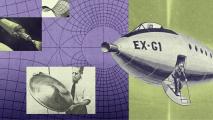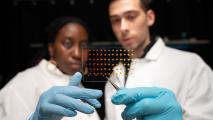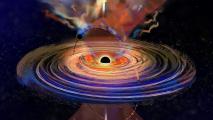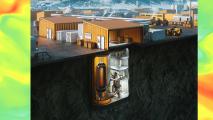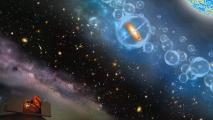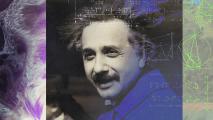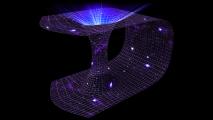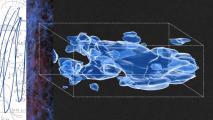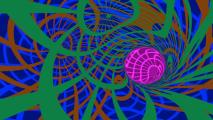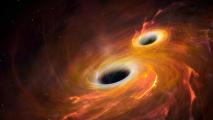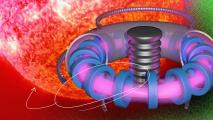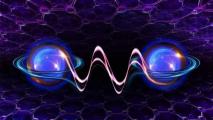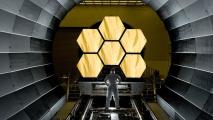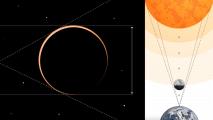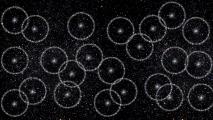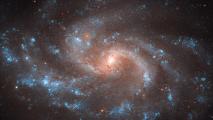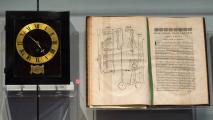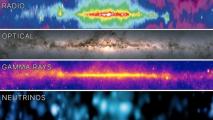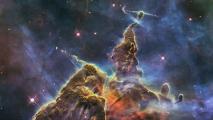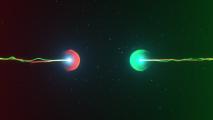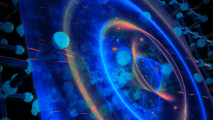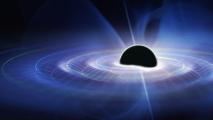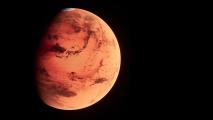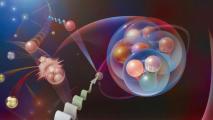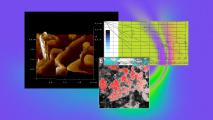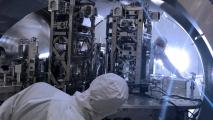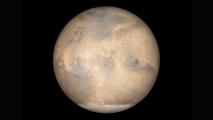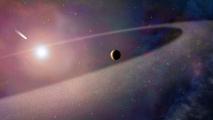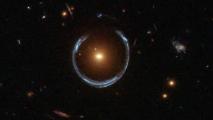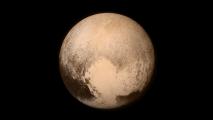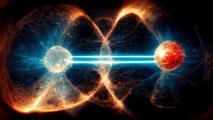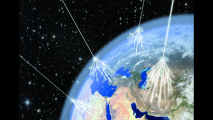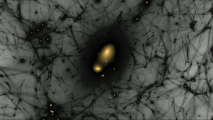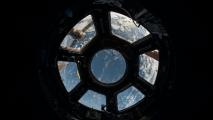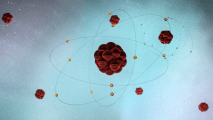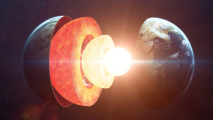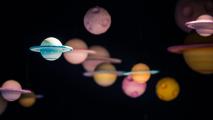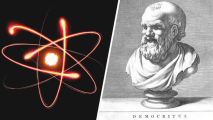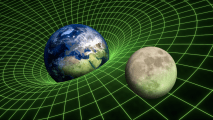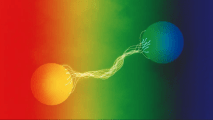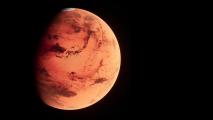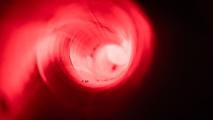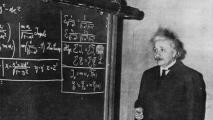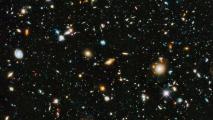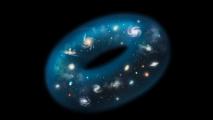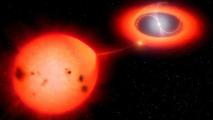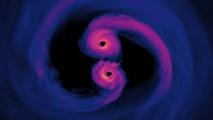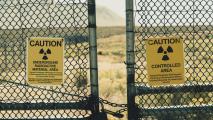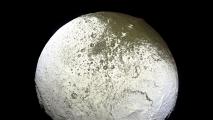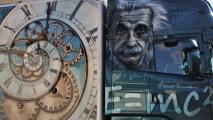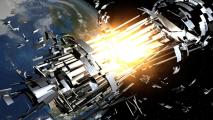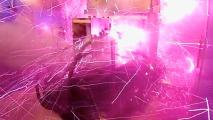Field: Physics
The left–right twist that could rewrite tech
Scientists are harnessing chirality — the left- and right-handedness of molecules — to build better batteries, sharper displays, and more.
The search for anti-gravity propulsion
Exploring the strange intersection of science, conspiracy, and military secrecy in the decades-long quest for anti-gravity propulsion.
The big problems driving nanotech development
Freethink talks to Brian Anthony, associate director of MIT.nano, on the enormous benefits – and challenges – of microscopic tech.
With inspiration from “Tetris,” MIT researchers develop a better radiation detector
A new detector system based on the game “Tetris” could enable inexpensive, accurate radiation detectors for monitoring nuclear sites.
Persistent “hiccups” in a far-off galaxy draw astronomers to new black hole behavior
Scientists have found a large black hole that “hiccups,” giving off plumes of gas, revealing another black hole.
How three laser-shooting spacecraft could reveal the birth of the universe
The first space-based mission to detect gravitational waves, LISA, could give us a brand new perspective into the universe’s past.
Nuclear’s role in a net-zero world
Is nuclear power a necessary part of the transition away from fossil fuels? As the debate rages on, new technologies may be shift the balance.
How potatoes can keep an eye on nuclear radiation
Plants scientists are researching how fields of genetically modified potato plants could detect radiation.
Astronomers spot 18 black holes gobbling up nearby stars
Scientists have identified 18 new tidal disruption events (TDEs) — when a nearby star is tidally drawn into a black hole and ripped apart.
What was it like when supermassive black holes arose?
At the center of nearly every massive galaxy is a supermassive black hole ranging from millions to tens of billions of solar masses.
Einstein’s 7 rules for a better life
His fame extended far beyond the field of physics, as Einstein played major roles in politics, media, and even the everyday affairs of life.
Google’s quantum computer suggests that wormholes are real
Until recently, wormholes were considered a mathematical curiosity, but Google's quantum computer suggests that wormholes might be real.
Scientists rule out a popular alternative theory to dark matter
A passionate minority deny the existence of dark matter and embrace MOND (Modified Newtonian Dynamics) to explain the observations.
“Singularities don’t exist,” claims black hole pioneer Roy Kerr
Using a powerful mathematical argument, black hole expert Roy Kerr argues that singularities shouldn't physically exist. He may be right.
Light may cause water to evaporate (even without heat)
MIT researchers propose a new phenomenon that causes to water evaporate without heat. They call it the “photomolecular effect.”
IBM unveils world’s largest quantum chip
Tech giant IBM is pushing the field of quantum computing forward with Condor, the world's largest quantum chip.
Do gravitational waves exhibit wave-particle duality?
One of the incredible revolutions of quantum mechanics is wave-particle duality: all fundamental quanta exhibit both wave-like and particle-like behavior.
Pursuing fusion power
Many researchers now believe that within the next few decades, power plants will provide carbon-free electricity from thermonuclear fusion.
MIT physicists turn pencil lead into “gold”
MIT physicists have metaphorically turned graphite, or pencil lead, into gold by isolating five ultrathin flakes.
Is the Universe infinite?
The limits to which we can observe the Universe are set by three things: the rate of expansion, the time since the Big Bang, and the speed of light.
How physics models could improve NBA teams’ performance
Density functional theory, a model used to study quantum-entangled particles, has surprising relevance on the basketball court.
Explore JWST’s deepest views ever for yourself
If you want to observe the Universe more deeply than ever before, simply point your high-powered observatory at the same region of sky.
From a five-layer graphene sandwich, a rare electronic state emerges
When stacked in layers in a rhombohedral pattern, graphene takes on a rare state that could advance powerful magnetic memory devices.
The 2023 annular eclipse will have huge consequences 6 months later
Only twice a year are the conditions right for the Sun, Earth, and Moon to align in space: creating conditions for either solar or lunar eclipses.
Physicists coax superconductivity and more from quasicrystals
In research that could peak interest into this enigmatic class of materials, physicists coax superconductivity and more from quasicrystals.
QBism and the philosophical crisis of quantum mechanics
Quantum interpretations generally fall into two categories: psi-ontological and psi-epistemic. Both have philosophical implications.
How a scientist looking to prove his food wasn’t fresh discovered radioactive tracers and won a Nobel Prize
George de Hevesey had the suspicion the cooks were reusing leftovers and made his dinner into a radioactive tracer experiment.
Astronomers spot the first “bounce” in our Universe
Imprinted in the structure of the universe are "bouncing" signals from early on: where gravitating normal matter was pushed out by radiation.
New experiment brings us closer to unbreakable quantum encryption
Researchers at Linkӧping University have built a quantum random number generator to be easier to integrate into consumer electronics.
The physics of why the first clock in America failed
When the first Dutch-built pendulum clock was brought to the Americas, it failed to keep accurate time on the continents of the new world.
“Ghostly” neutrinos help us see our Milky Way as never before
A unique photograph of the Milky Way galaxy was captured using the IceCube detector, which observes high-energy neutrinos from space.
Arrays of quantum rods could enhance TVs or virtual reality devices
MIT engineers have used DNA origami scaffolds to create structured arrays of quantum rods, which could be incorporated into LEDs.
Is quantum computing hype or almost here?
The potential of quantum computing is vast, but it remains uncertain when or if we will be able to harness its full capabilities.
5 revolutionary cosmic ideas that turned out to be wrong
These ideas could have revolutionized our concept of the Universe, but since evidence paves the road to reality, we've had to abandon them.
New physics? Ultra-precise measurement in particle physics confounds scientists
For electrons, the predictions of the Standard Model agree with measurements. But this isn't the case for the muon, the electron's cousin.
Time has some fundamental differences from every other dimension
While spacetime itself is four dimensional, it can be decomposed into three spatial dimensions and one time dimension.
Discovery of “demon” particle could aid superconductor hunt
The elusive “demon” particle has been discovered in a superconductor-like metal nearly 70 years after it was first predicted to exist.
We’re in a “fog of war” as experts and amateurs rush to replicate superconductor LK-99
A group of Korean scientists are claiming the first superconductor that works in our everyday environment. Is it real?
“Muon g-2” experiment hints that a mystery is bubbling inside the quantum foam
Scientists have observed discrepancies between theoretical predictions and measurements of the muon's magnetic properties. What's hiding?
Quantum superposition begs us to ask, “What is real?”
The weirdness of quantum superposition means the same experiment, repeated many times under the same conditions, can give different results.
How an H.G. Wells sci-fi novel predicted Oppenheimer and atomic bombs
The “atomic bombs” in H.G. Wells’ 1914 novel The World Set Free influenced a pioneer of real-world nuclear weapons: physicist Leó Szilárd.
Quantum biology: Your nose and house plants are experts at particle physics
Quantum processes, normally associated with the very small or very cold, have been found to occur in biological systems. This was unexpected.
Astronomers use dead stars to measure gravitational waves produced by ancient black holes
As research challenges theories of how galaxies evolved, studying the era after the Big Bang using gravitational waves could be invaluable.
How Mars lost its magnetic field — and then its oceans
Were it not for Earth's strong magnetic field, our planet would look just like Mars. And strong magnetic fields may be rare in the Universe.
Our language is inadequate to describe quantum reality
In the quantum world, the observer determines the physical nature of what is being observed. The notion of an objective reality is lost.
New navigation system works even when GPS fails
A new navigation system that tracks subatomic particles called “muons” could help us get around indoors, underground, and underwater.
Plants perform quantum mechanics feats that scientists can only do at ultra-cold temperatures
There may be a link between quantum mechanics and photosynthesis explaining why plants are so effective at converting light to food.
“Spooky” quantum biology might cause your DNA to mutate
Research suggests that quantum effects could drive mutations in human DNA — the latest development in the emerging field of quantum biology.
How the world’s most sensitive yardstick reveals secrets of the universe
When two massive objects – like black holes or neutron stars – merge, they warp space and time. Here's the tool that measures the resulting waves.
How to terraform Mars, without nukes, on a budget
Terraforming Mars has been a dream for decades; here’s how we might get it started today.
For the first time, astronomers have detected a radio signal from the massive explosion of a dying white dwarf
Patience and persistence pays off in ways researchers never expected, allowing them to hear the dying whispers of a distant star.
Astronomers have directly detected a massive exoplanet. The method could transform the search for life beyond Earth.
There are many techniques to search for planets orbiting other stars. Perhaps the simplest of these is called direct imaging, but it's not easy.
NASA’s Habitable Worlds Observatory to finally answer the epic question: “Are we alone?”
The Nancy Roman Telescope is already being built with a goal no smaller than to find inhabited planets beyond Earth.
Why Earth is the only planet with plate tectonics
Here in our Solar System, of all the known planets, only Earth — not Mercury, not Venus, and not Mars — possesses plate tectonics.
Quantum entanglement just got a whole lot weirder
Normally seen with identical particles, entanglement has just been demonstrated between particles with opposite charges.
How Einstein tried to model the shape of the Universe
Two years after proposing his general theory of relativity, Einstein endeavored to find the shape of the Universe.
“Nothing” doesn’t exist. Instead, there is “quantum foam”
Even if you took an empty container devoid of all matter and cooled it to absolute zero, there is still "something" in the container.
ChatGPT answers physics questions like a confused C student
When asked about physics, ChatGPT gave a mixture of true, false, relevant, irrelevant, and contradictory answers — all with authority.
How Einstein challenged quantum mechanics and lost
Is quantum mechanics weird? Yes. Is it wrong? No. At least not in any way Albert Einstein could prove.
Brain experiment suggests that consciousness relies on quantum entanglement
Researchers possibly witnessed entanglement in the brain, indicating that some brain activity, like consciousness, operates on a quantum level.
How to prove Einstein’s relativity for under $100
Muons only live for 2.2 microseconds before decaying. Thanks to Einstein's relativity, they make it to the surface of the earth. Here's how to prove it.
The case for dark matter has strengthened
Though it makes up about 26% of the Universe, we cannot see dark matter. But we know it's there because we can see its effects.
What happens when an astrophysicist puts ChatGPT to the test?
Can an astrophysicist get ChatGPT to learn and assimilate new information and give correct answers where it gave confident but false ones?
Ring galaxies, the rarest in the Universe, finally explained
After decades of wondering how ring galaxies form, we've caught them in enough stages of evolution that we finally know where they come from.
Not just light: Everything is a wave, including you
In the 1920s, the wave-particle duality of light was extended to include all material objects, from electrons to you.
China’s new space station is open for business
On Nov. 29, 2022, the Shenzhou 15 mission launched from China’s Gobi Desert carrying three taikonauts – the Chinese word for astronauts.
“Galactic archeology” makes spectacular find: the Milky Way is over 13 billion years old
Scientists have pushed the Milky Way's early history back more than 2 billion years: to less than 800 million years after the Big Bang.
After 50 years, fusion power hits a major milestone
Researchers in California achieved net energy gain in a thermonuclear fusion experiment. But how great of a breakthrough is this, really?
Will physics prevent SpinLaunch from succeeding?
SpinLaunch has a working prototype successfully launching objects at 1,000 miles-per-hour, but will the laws of physics stand in the way?
Here’s what that fusion power breakthrough really means
This year, NIF reports that it has achieved "ignition" — that is, it has achieved slightly more fusion energy output than laser energy input.
Discovery finds the Earth’s core is constantly changing the length our day
The length of our day changes slightly over a six-year period. This recent discovery has perplexed scientists for about a decade.
What is the largest planet out of all the ones we know?
The "upper limit" to the size of our planets is exceeded in other stellar systems, but double Jupiter's radius seems to be the limit.
How Greek philosopher Democritus predicted the atom in 400 B.C.E.
The idea of atoms goes as far back as the ancient Greek philosopher Democritus in 400 B.C.E., who thought physics left no room for free will.
Einstein’s theory of general relativity passes another test, with implications for dark matter and dark energy
Scientists carried out an ultra-precise test of a core premise of Einstein’s modern theory of gravity. The theory stood up.
The technology we (or aliens) need for long-distance interstellar travel
Interstellar distances are vast, and extremely advanced technology will be required if we (or aliens) want to visit other star systems.
Quantum entanglement wins 2022’s Nobel Prize in physics
Three pioneers — John Clauser, Alain Aspect, and Anton Zeilinger — helped make quantum information systems a bona fide science.
Paradox-free time travel is “logically” possible, say physicists
An undergraduate and his supervisor ran the numbers and found paradox-free time travel to be mathematically consistent.
A neural network discovered Copernicus’ heliocentricity on its own
Scientists trained a neural network to predict the movements of Mars and the Sun, which placed the Sun at the center of our solar system.
1.7 billion years ago, Earth had a natural nuclear reactor
Seventeen natural sites possessing ancient nuclear reactions have now been found: evidence of Earth's first nuclear reactor.
This logarithmic view of the Universe will blow your mind
From here to the limits of what we can see, here's a breathtaking illustrated logarithmic view of the Universe.
What are wormholes? An astrophysicist explains
A wormhole is like a tunnel between two distant points in our universe that cuts the travel time from one point to the other.
The true meaning of Einstein’s most famous equation: E=mc²
Although most people can name Einstein's most famous equation, E = mc², very few people can explain what it means.
There are more galaxies in the Universe than even Carl Sagan ever imagined
There are between 6 and 20 trillion galaxies out there. Carl Sagan's "billions and billions" was far too low of a guess.
The Universe is flat. Here’s what that teaches us.
When we measure it, we find that our Universe really is flat. Here's what we can learn from that, and why it matters so much.
A new nova disappeared faster than ever, and an even bigger cosmic catastrophe is coming
Today, the fastest-ever nova to fall off has been discovered, and even faster ones may be out there. What comes next?
NASA-funded scientist says “MEGA drive” could enable interstellar travel
The mega drive might provide enough thrust for a spacecraft to travel near the speed of light using only electricity, says one physicist.
Black hole mergers obey the laws of thermodynamics
An analysis of the gravitational wave data from black hole mergers show that the event horizon area, and entropy, always increases.
Why Einstein is a “peerless genius” and Hawking is an “ordinary genius”
Why some people are considered geniuses while other equally impressive people are not seems largely arbitrary.
Scientists see “rarest event ever recorded” in search for dark matter
Researchers observed an ultra-rare particle interaction that reveals the half-life of a xenon-124 atom to be 18 sextillion years.
Australian scientists put the quantum world on a microchip
A first-of-its-kind quantum simulator could lead to the creation of never-before-seen materials powered by quantum phenomena.
Nuclear isomers were discovered 100 years ago
Protons and neutrons in an atom’s nucleus can be arranged in different configurations, creating nuclear isomers.
Lasers could cut lifespan of nuclear waste from “a million years to 30 minutes,” says Nobel laureate
If no solution is found, we're already stuck with some 22,000 cubic meters of long-lasting hazardous waste.
After 350 years, astronomers still can’t explain the solar system’s strangest moon
Saturn's Iapetus, discovered way back in 1671, has three bizarre features that science still can't fully explain.
Einstein was right. Flying clocks around the world in opposite directions proved it.
By flying planes both with and against Earth's rotation, and returning them all to the same starting point, we tested Einstein's theory.
How the Kessler Syndrome can end all space exploration and destroy modern life
The sheer amount of stuff already floating in space makes the domino effect of explosions a likely possibility.
Search reveals eight new sources of black hole echoes
The researchers' findings will help scientists trace a black hole’s evolution as it feeds on stellar material.
Scientists blow up their lab after creating strongest magnet ever
Scientists knew that it would probably explode, but they did not expect to reach such a record magnetic field.
The Large Hadron Collider is back online
The world's biggest particle accelerator, the Large Hadron Collider (LHC), is back online after a three-year hiatus.

